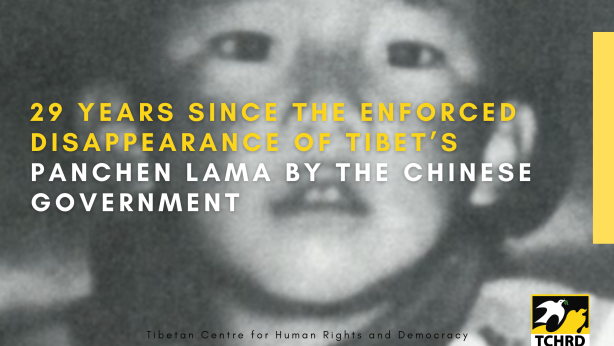Solo Tibetan protesters calling for Dalai Lama’s return sentenced to prison
Chinese authorities have intensified crackdown on solo Tibetan protesters as information from Tibet confirms the sentencing of two monks and detention of two others in Ngaba County in Ngaba (Ch: Aba) Tibetan and Qiang Autonomous Prefecture, Sichuan Province, in Amdo Province.
According to information received by Tibetan Centre for Human Rights and Democracy, Gedun Phuntsok and Lobsang Kelsang, both monks from the local Kirti Monastery, were sentenced to prison for carrying out peaceful solo protests calling for the return of the exiled Tibetan spiritual leader Dalai Lama, and for freedom and equality for Tibetans.

Gedun Phuntsok, 18, was sentenced to four years in prison toward the end of October this year. The County People’s Court in Tashi Ling (Ch: Li) County in Ngaba Prefecture sentenced Gedun.
The same court sentenced Lobsang Kelsang, 19, to three and a half years prison term on 2 November 2015.
Authorities have decided to take both monks to Mianyang Prison to serve their sentences. Majority of Tibetan political prisoners from Sichuan are imprisoned at Mianyang near Chengdu.
Earlier this year, TCHRD reported on the arbitrary detention of Gedun Phuntsok on 8 March 2015 and Lobsang Kelsang on 17 March 2015. Gedun Phuntsok had staged his protest, carrying a huge portrait of the Dalai Lama draped in a yellow khatag (Tibetan ceremonial scarf) on his head as he shouted slogans: “Let His Holiness the Dalai Lama return to Tibet” and “Freedom and equality for Tibet”. Lobsang Kelsang also held a portrait the Dalai Lama with his left hand and scattered lungta leaflets with his right, as he shouted slogans calling for freedom in Tibet. Both men had carried out their protests at the main road of Ngaba County town and had been detained incommunicado until their recent sentencing.
On the night of 30 November 2015, another monk from Kirti Monastery named Lobsang Gephel, 28, was detained by the police while he was returning to his room at the monastery. He is being held at Ngaba County Detention Center. There is no information on his current condition or the reason behind his sudden detention. He was the cashier at the Medical College (Tib: menpa dratsang) of Kirti Monastery.

Lobsang Gephel had earlier been detained for a long time, and then given three-year prison sentence in May 2011. He was released in 2013. He hails from Meruma town in Ngaba County, and was born to father Orgyen Tsering and mother Lhamo Kyi. He is the oldest among his nine siblings and became a monk at a young age.
The same night, security personnel detained Drukdra, a monk at Kirti Monastery, picking him up from his monastic quarter. Drukdra had earlier served one year and four months prison term in 2008. He was from Soruma Village, Choejema Town, in Ngaba County.
Gedun Phuntsok and Lobsang Kelsang became monks at a young age at Kirti Monastery. Gedun Phuntsok is the son of Mr Tragya and Mrs Rigo, both residents of Chugle Gabma Village in Cha Township, Ngaba County. Lobsang Kelsang, son of Mr Tsering and Mrs Dechen, hails from Chugle Gabma Village in Cha Township, Ngaba County. He is the second youngest among his three siblings.
TCHRD condemns the sentencing of Gedun Phuntsok and Lobsang Kelsang for exercising their right to freedom of expression and to peaceful protest. There were no legal grounds for their sentencing, since they were merely exercising rights guaranteed in Chinese Constitution. Article 35 of the Chinese Constitution states, “Citizens of the People’s Republic of China enjoy freedom of speech, of the press, of assembly, of association, of procession and of demonstration.” But, like many other Tibetans, both were arbitrarily detained, held incommunicado for months, tortured to extract confessions and then sentenced to prison, without any access to due process or legal representation of their choice. In particular, they were detained and sentenced in Tashi Ling County, and not in Ngaba County.
In light of the impunity enjoyed by Chinese law enforcement officers, TCHRD is deeply concerned about the security and health of Lobsang Gephel and Drukdra and calls on the local Chinese authorities to take full responsibility for their physical and psychological health. Security officers routinely employ torture and other inhumane treatments to extract confessions out of detainees in Tibet.
The Centre is equally concerned that local authorities are employing counterproductive policies to bring stability in Tibet. Repression has brought untold suffering and hardships to Tibetans. Chinese authorities are only prolonging this vicious cycle of repression and resistance by torturing and imprisoning Tibetans for exercising their human rights.


